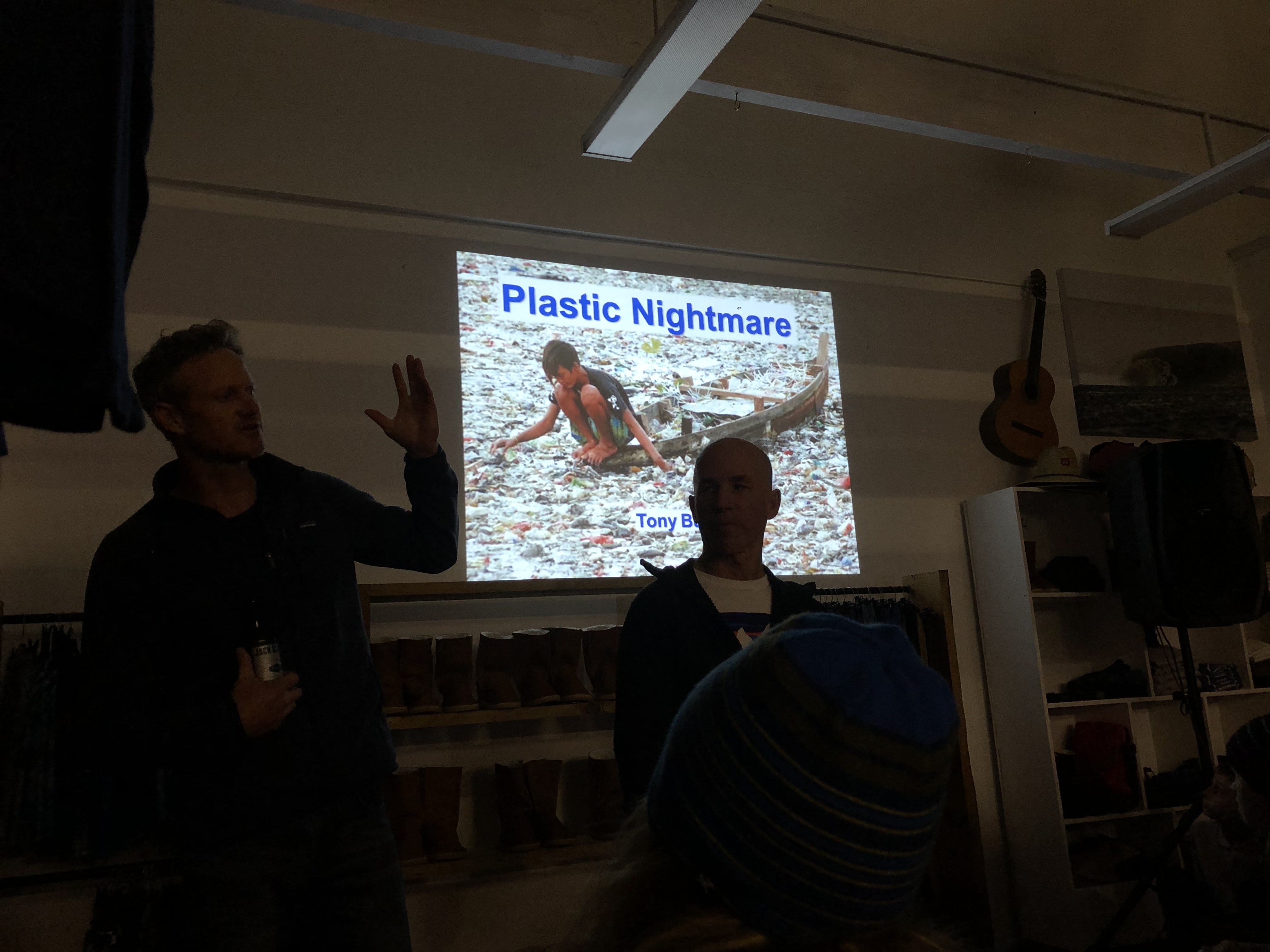Surfer and oceanographer Dr. Tony Butt, who has been a regular at the big wave spots around the Kommetjie area over the years and who has given talks about the science of waves and geomorphology, spoke again this evening at the Kommetjie Surf Shop, but this time it wasn’t about surfing or the formation of waves, rather he presented his research and thoughts on this “Plastic Nightmare” we are living in and are all contributors to.
The problem is that we’re using a material that was created to be durable and long-lasting, to produce items that we only use once, so-called single use plastic, with some of the big culprits here being plastic water bottles, straws, and food and product packaging. Items that don’t make it to recycling often end up polluting our oceans, beaches and rivers. Even in a relatively unspoiled place like Kommejtie, a walk on the beach will turn up a significant amount of plastic. And recycling is actually “down-cycling”, meaning that items that get recycled are recycled into lower forms of plastic until they aren’t recyclable at which point they end up in landfills, and often from the landfills they get washed into rivers and oceans. And while we may feel good about recycling, recycling of plastic doesn’t really deal with the ultimate problem of plastic accumulation on our planet. A study published in “Science Advances” estimates that as of 2015, 6300 million tons of plastic has been produced, of which only 9% has been recycled, 12% incinerated and 79% accumulated in landfills. And if current trends continue they estimate that 12 000 million metric tons of plastic waste will be in landfills or in the natural environment by 2050. The Ellen MacArthur Foundation estimates that by 2050 the ocean will contain more plastic by weight than fish.
Tony said that while beach cleans are great for creating awareness, with the amount of new plastic that is created every second (“Humans produce almost 20 000 plastic bottles per second”), the problem really needs to be tackled at the source for any significant long-term progress to be made. My own research has uncovered initiatives like “The New Plastic Economy” which corroborates this: “Today, clean-up activities are a short-term necessity, but addressing the source of this problem in the long term can only happen by changing the way we produce and use plastics”. The report goes on to propose a solution of moving to a circular economy where plastics never become waste, and in which economic opportunities are created.
A World Business Council for Sustainable Development initiative called Factor 10 seems to have the buy-in from at least 30 prominent companies that plan to “implement the circular economy at a global scale”. These companies include: Accenture, Arcadis, ArcelorMittal, BASF, BCG, BMW Group, CRH, Dow, DSM, Enel, ExxonMobil, EY, Honda, IFF, KPMG, Michelin, Navigant, Novartis, Philips, PWC, Rabobank, Renault, SABIC, Saint-Gobain, Solvay, Stora Enso, Veolia, Yara, Yokogawa
For more information on the Circular Economy, check out other Ellen MacArthur publications here: https://www.ellenmacarthurfoundation.org/publications.
Other positive promises
In a plan called “World Without Waste”, Coca-cola has announced that they will "collect and recycle the equivalent of every bottle or can it sells globally by 2030".
A new chemical recycling technology also shows promise for enabling the recycling of previously non-recyclable plastics.
So while the talk left me a bit despondent about the state of affairs, my subsequent research does show that there could be some light at the end of the tunnel, thanks to organisations such as the World Economic Forum and the Ellen MacArthur Foundation. Of course, it will rely on businesses to actually implement the proposals.
